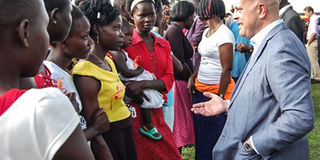Kibuku seeks answers for teenage pregnancies

Intervention. The Italian ambassador to Uganda, Mr Massimiliano Mazzanti, interacts with some of the teenage mothers in Rubongi Sub-county in Tororo District in December last year. PHOTO BY JOSEPH OMOLLO
What you need to know:
Danger. The Kibuku RDC, Ms Juliet Najjuma, says teenage pregnancies are the leading cause of school dropouts in the district.
On a cold Friday morning, Olivia Nandutu, a 14-year-old, looking troubled, sits quietly at the door of her uncle’s house as she watches her colleagues trekking to school.
“I would also be going to school but that dream was shattered the day I got pregnant,” Nandutu narrates.
Nandutu dropped out of school last year while in Primary Five at Kibuku Primary School after she was impregnated by a man, who disappeared from the village.
“I gave birth and I now stay home to take care of my five-month-old baby girl,” she says.
After she was impregnated, the school management chased her away and her parents disowned her.
“I only sought refuge at my uncle’s home and started doing casual jobs in the neighbourhood for a living,” she says.
But Nandutu’s case is just one of the many child mothers in the district.
According to a new report, which was conducted by Bukedi Action for Integrated Development Initiatives-International (BAfIDI), a non-governmental organisation, working to end teenage pregnancy and gender-based violence in the region in partnership with District Health Department, teenage pregnancy in the district is 37 per cent, a figure higher than the national average of 25 per cent.
The research was conducted last year in all sub-counties of the district.
The director of BAfIDI, Mr Abel Wilson Walekhwa, while revealing the findings to district leaders at Kadama Town Council headquarters on Saturday, said Kibuku has surpassed other districts such as Mayuge, Butaleja, that had been previously reported with the highest teenage pregnancy rates in the country.
Mr Walekhwa blamed the teenage pregnancies and school dropouts on poverty and failure by parents to provide scholastic materials.
“When we were doing our research, we interfaced with many child mothers averagely at the age of 14 years and many of them had also dropped out of school,” Mr Walekhwa said.
He said they have started equipping teenage mothers with vocational skills such as making of bags from old newspapers.
The Kibuku Resident District Commissioner, Ms Juliet Najjuma, said teenage pregnancies are the leading cause of high school dropouts.
The RDC was speaking as a chief guest at a camp at Kadama Town Council headquarters organised by BAfIDI last week. The camp was held under the theme: “End school dropout for a holistic empowered nation”.
“The rate at which girls are producing at tender age are worrying and we need to mitigate this,” she said.
Dr Rashid Simuya, the in-charge of Kibuku Health Centre IV, says of every 10 expectant mothers who go for antenatal care, six are teenage mothers.
“Every day I see about six teenage mothers at the health facility which is a big number. We need a special programme to fight the vice,” he said. He attributed the cases to lack of information on dangers of early sex.
“Parents should talk to their daughters openly about early sex, early marriages and this will save the girl-child from such vices,” he said.
The intern nurse, Mr Rashid Opolot, said: “Most of these girls are too young to push the baby, so the only alternative is to operate them. And most of them don’t know anything about the reproductive health,” Ms Opolot said.
The Kibuku District Secretary for Education and Health, Ms Ruth Logose, said they have started educating young girls through various NGOs about reproductive health.
“We have also started arresting defilers so as to send a strong message to other culprits, who are spoiling the future of our children,” she said.
The District Police Commander of Kibuku, Mr Steven Twinomugisha, asked parents and local leaders to report cases of defilement to police for action.
“We as police are ready to take action against the defilers but we need support from cultural leaders, local leaders, religious leaders and others to fight the vice. If we can join hands the vice will be kicked out,” he said.
The Minister for Gender and Culture, Ms Peace Mutuzo, while addressing National Women’s Council meeting in Mbale District, said the eastern region teenage pregnancy rate stands at 37 per cent.
The meeting was organised by Women’s International Peace Centre in partnership with National Women Council. She said poverty has fuelled child marriages.
“And to make matters worse, some parents shield the suspects from prosecution,” she said.
Early pregnancy
Prevalence. The 2016 Uganda Demographic and Health Survey indicates that 25 per cent of the adolescent girls and young women aged 15-19 in Uganda are pregnant or mothers, which is one of the highest teenage rates in sub-Saharan Africa. Early child-bearing is attributed to low education attainment.
Dangers. Teenage pregnancy has drastic and far-reaching health, development and economic effects at the individual, family, community and national levels.
Efforts. The Ministry of Health in 2018 launched a drive dubbed “Live your Dream” aimed at fighting teenage pregnancy.


